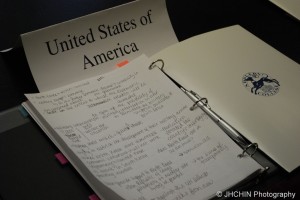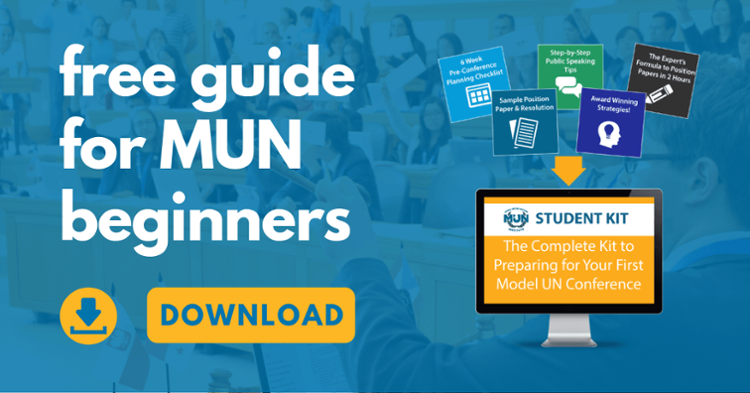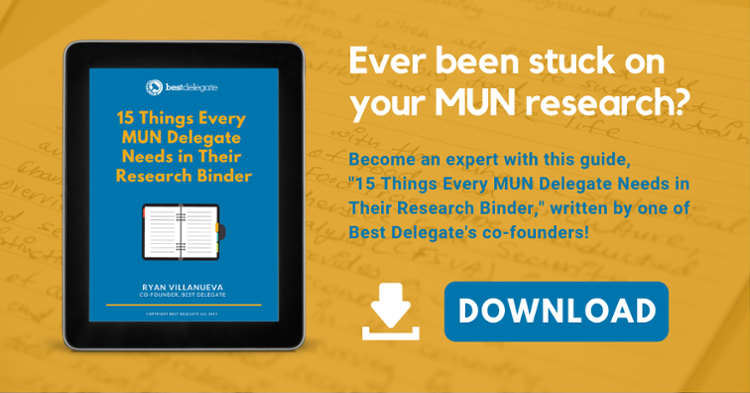You see it everywhere at MUN conferences. You’ve made your own — or, more likely, your advisor told you to make one. And you probably didn’t want to. It’s confusing to create and cumbersome to carry. You might even be embarrassed to bring one to committee — maybe you poke fun at others for bringing theirs.

When I started doing Model UN, research was a chore. I wrote position papers at the last minute, printed out a bunch of random websites the night before conferences, and read a fraction of it on the bus. Research was something boring I needed to do before I could do the fun stuff.
But I soon realized this was putting me at a disadvantage. I couldn’t speak or debate as freely because I didn’t know the facts. I was afraid to suggest an idea because I wasn’t sure if the committee had done it already. And it’s pretty obvious to chairs who has done their research and who has not. Not doing mine made me feel uncomfortable.
I knew that if I was confident in my research, that confidence would come through in speeches and debates. I just needed a way to research that took as little time as possible to learn just what I needed to know, but to know it thoroughly. I needed to do my research to the point that it made me feel comfortable in committee.
I needed to put together a research binder.
And many conferences and committees later, I’ve come to appreciate the value of a good, well-organized binder. There are a few reasons why:
- It actually speeds up research. Putting together a binder sounds time-consuming, but it takes less time and brain power to learn something that is organized well. When you’re reading different websites and books, the important facts are spread out across different sources. It ultimately takes more time to read through a random assortment of printed pages than to just organize it in the first place.
- It gets faster with experience. After putting together a few binders, I realized I was turning to the same sources over and over. Eventually, I would just print everything out first, put together the binder, and then read through it all in one shot. And since I chose to specialize in certain committees, I could easily recycle my research binders and improve on them.
- It’s useful for more than the information it contains. Having your research readily available in committee is very helpful. In addition, bringing a well-organized binder to committee communicates to the chair and other delegates that you mean business. But be careful – you may not want to communicate this kind of intensity, depending on how you want to be perceived in committee.
I organized my binders by starting from the “big picture” — conference, committee, and country — then zooming in on the details — topics, policies, and solutions. In other words, I framed my approach to research. Using a framework made it easier to do research because it gave me an idea of what to look for, and I could use it for every conference.

Using this framework, there are 15 things every delegate should include in their binders:
Conference
1. Awards Policy. If you’re trying to win an award, then you should know what the conference values and what your chair is looking for.
2. Rules of Procedure. Rules tell you how committee is going operate, and what you can and cannot do. They differ for every conference — not just what the rules are, but how they are applied.
Committee
3. Your committee’s actual UN website. The goal of a committee is to pass a resolution, which depends on what a committee can and cannot do. You want to understand your committee’s mandate (why it was created), powers (what it can do), organization (how it fits into the UN and the larger international community), and membership (who’s in it).
4. UN Charter. If you are in a GA, ECOSOC, or Security Council committee, then the source of your committee’s power is the UN Charter. If you are in a regional organization like NATO or OAS, then you are still affected by the Charter, particularly Chapter VII on international security and Chapter VIII on regional arrangements.
Country
5. CIA Factbook. Every MUNers go-to source for essential information on their country. You want to know your country’s location, neighbors, population size, type of government, type of economy, trade partners, and the international organizations it’s a part of. Not knowing this information as your country’s representative can be potentially embarrassing.
6. Wikipedia. Information on your country’s history and its recent controversies. There should be articles on your topic, too. Wikipedia might not be edited as rigorously as a print publication, but you are not writing a paper – you’re attending a Model UN conference. Just take note of any potential issues that are listed at the topic of Wikipedia pages, e.g. “This article needs additional citations for verification.”
Topics
7. Background Guide. Either you, another delegate, or your chair will inevitably refer to something written in the committee’s background guide during a conference. Also, what your chair has written about is what he’ll focus on in committee. Use that knowledge to craft speeches and operative clauses that grab the chair’s attention.
8. News Articles. You want to know the latest news on your topics, as well as your own country. The simplest way to do this is to run searches on Yahoo! News and Google News, and print out the headlines. BBC Online also features easy-to-use timelines and profiles on your issues and country. Large publications like the New York Times and Wall Street Journal also have in-depth coverage on their websites.
9. Resolutions, Treaties, and Conventions. Before you can do anything on the topic, you need to know what’s already been done. You can find past resolutions through the UN documentation center, although it can be difficult to navigate. Once you’ve found the latest resolution, the perambulatory clauses should direct you to other resolutions. Also, the most relevant piece of international law on your topic might not be a past resolution, but instead a treaty or convention.
Policies
10. Speeches and Press Releases. These are the ways that policy-makers set policy. Be sure to use speeches and press releases from people in the executive branch of your country’s current government (President, Prime Minister, Foreign Minister / Secretary of State, Ambassadors). Legislators and judges may say something different, but as a representative of your country, you work for the Head of State / Head of Government. Start with the website for your country’s Ministry of Foreign Affairs / Department of State.
11. Voting Record. Actions speak louder than words. If your country’s leaders have not clearly articulated a policy on your topic, then you can infer it from how your country has voted on past resolutions, treaties, and conventions (or whether they were even present). Note that recent speeches may indicate a change in policy away from however your country has voted in the past, especially if your government has changed administrations. Nonetheless, you still want to know how your country’s past actions on the topic, for your own knowledge, and in case anyone asks.
Solutions
12. Op-Ed and Blog Articles. These writers are coming from a personal or journalistic perspective, but they can still give you ideas that you can propose in committee and use in resolutions. You can start with large publications like the New York Times or Wall Street Journal, but don’t forget about blogs, too. Just be aware of their biases, and make sure their ideas conform to your country’s policies.
13. Think Tanks. Organizations like RAND are paid to come up with solutions to the topics you discuss in Model UN. Think tank publications have more depth and evidence than an opinion article, but they’re typically not as dense as an academic paper. They might also be pushing a certain agenda, so be aware of that. Otherwise, they are a great starting point for proposing potential solutions.
14. Academic Papers. These are tough reads and the information is way too dense for Model UN. But they are probably the most insightful and rigorously edited sources you will find online. You can use Google Scholar to find papers. Don’t spent time trying to process a paper the way you would do for a class. Read the abstract and skim the paper for ideas that you can use in committee.
15. Your Ideas. Include in your binder your position papers, working papers, notes, thoughts, as well as blank lined paper – Don’t rely on a conference to bring enough paper for draft resolutions and note passing. You can do all the research you want, and you can be really fast and efficient at it, but none of that matters until you boil down what you’ve read into ideas that you can explain in your own words.
Want a shareable version of this article to share with your team? Download the guide to everything you need in your research binder!


